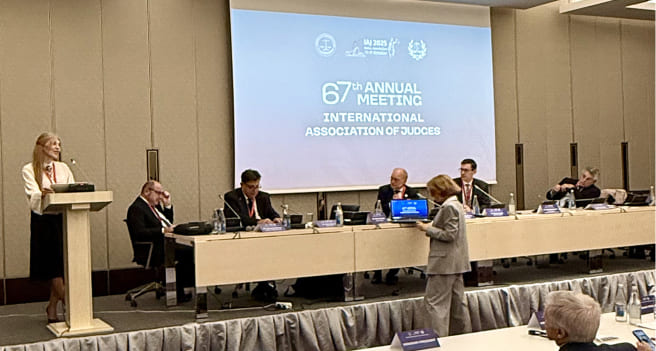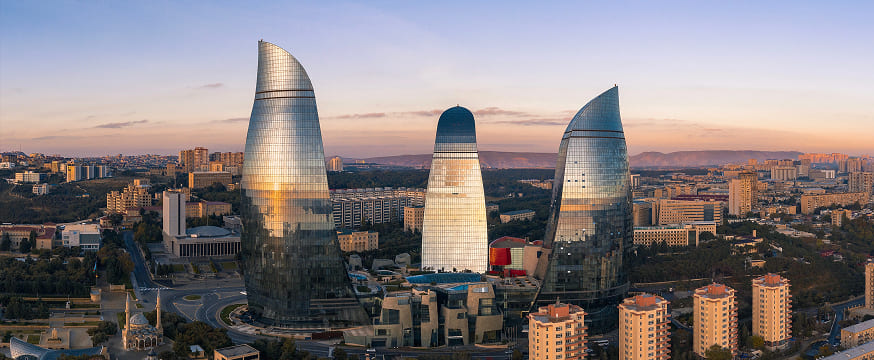Interview of Yevtushenko Elena Ivanovna to Globes newspaper
“Many court buildings were bombed in the temporarily occupied territories”: the consequences of the war for the judicial system in Ukraine
In the first month of the war, many court buildings across Ukraine were bombed by the Russians. Some were destroyed, and some were dismembered, Olena Ivanovna says wistfully: “Life in Kiev is very difficult. You in Israel know what it's like to sit in shelters. Only on the Independence Day of Ukraine on August 24, there were 7 air alarms. There are cities that suffer daily shelling, especially in areas close to the Russian border.”
Work under frequent air alarm signals
“In the first month of the start of the war, most of the judges went to safer areas in the east of the country and worked remotely. A month after the start of hostilities, they returned to work in Kiev. She says that today in Kiev they are trying to maintain a normal schedule of life.
Residents work, training takes place only in educational institutions, which have a bomb shelter, but a large number of children study remotely.
Courts in Kiev operate in the shadow of many air alarms. “A lot of anxiety, there are a few a day. When there is anxiety, everyone runs to shelters.”
“€ Another subway, it's one big shelter. There is a decree that during an air alarm a break is made in court, the entire apparatus of the court must leave the building and go to the nearest metro station or to the nearest shelter.
After the air alarm goes off, everyone returns to their jobs. At the beginning of the fighting in February and until March, people even lived in the subway, along with their children and animals. Everyone lived underground in shelters.”
Judges were involved in the fight
The war also affected the judicial community. She tells about judge Lyudmila Kharchenko, who tried to escape with her family and died on the way from a bomb, as well as about the mobilization of most men between the ages of 18 and 60. Many judges also fight at the front.
Elena Ivanovna Yevtushenko worked as a judge for 39 years. Until last year, she was the president of the Association of Judges of Ukraine, and now she is a deputy.
She says that the president has not been able to come to Israel because men are forbidden by government decision to leave the country. Therefore, a delegation of four judges came exclusively women.
The judge explains that how the courts work in the country depends on the combat situation and can be divided into three categories:
The first is the courts in the occupied territories. “They don't work. 3 The majority of judges have no contact because the Russians cut the link first. No internet, no phone. Some of the judges managed to escape, but there are some who do not know what happened to them. There are judges who cooperate with the Russian side.”
The second is courts located in combat zones. The civilian population is under daily shelling, it is impossible to work there. As of today, 50 court buildings have been bombed and significantly damaged. In many cities there is no Internet, no telephone line or electricity.
The third category is the courts that have not been affected by the bombings and are located in relatively safe areas. Today they work and among them are Kyiv.
Regarding the cases that are being considered today in the judicial system, Yevtushenko says that “There are much fewer cases because people have left the country. More criminal cases. People have come back from the front with post-trauma, people who have seen death with their own eyes and don't even understand what crimes are.” To my question, she adds that at present cases in the commercial and civil spheres are of low priority.
She talks about such a phenomenon as the looting of abandoned houses. In Kiev, there is a curfew from 23:00 to 5:00 in the morning, residents are not allowed to leave the house. “Most of the crimes committed by Ukrainians are looting. Because many people have left the country, there are citizens who take advantage of the situation and break into homes. This usually happens in the evening. Punishment for looting is very severe. The judicial system in these cases works quickly.”

Retired Judge of the Supreme Specialized Court of Ukraine Olena Yevtushenko and three other Ukrainian judges arrived in Israel within the framework of the International Conference of Judges
In an interview with Globes, Yevtushenko talks about the increase in the number of criminal cases in Ukraine and courts in the occupied territories: “3 the majority of judges have no contact because the Russians have turned off the communication”.
The retired judge of the Supreme Specialized Court of Ukraine Olena Yevtushenko, together with three acting Ukrainian judges, arrived in Israel within the framework of the International Conference of Judges held in Israel. The Ukrainian delegation arrived in Israel by flight from Moldova. They crossed the border after traveling by car from Kiev, as civilian airports in Ukraine have been closed since the beginning of the Russian invasion on February 24 In a conversation with Globes, she tells what is happening in the judicial system in Ukraine during the war that has been going on for 7 months: many ships in the temporarily occupied territories are bombed, mobile phones the nationalization of judges - men, the break of contact with judges in the occupied parts of the country. Listening can be interrupted by even a few air alarm signals.




“Thank you to the Supreme Court of Israel”
It is important for her to thank the Supreme Court of Israel, which accepted a petition against the restriction of quotas on the entry of Ukrainian citizens to Israel: “I sincerely thank you for the support of our refugees.”
The petition, filed by lawyer Tomer Warszawa at the request of the Ukrainian ambassador, was directed against the policy of the Minister of the Interior, Yelet Shaked, to restrict entry from Ukraine to 5,000 non-Jews (Jews have the right under the Law of Return). Demand far exceeded quotas, and many were denied. The number of Ukrainians was limited, despite the mutual agreement between the countries on the abolition of visas.
The government argued in the Israeli Supreme Court that the mutual agreement does not apply during an emergency, but only at normal times when entry is for tourist purposes. According to the decision, the visa-free regime for citizens of Ukraine does not distinguish between an emergency period and an ordinary period, and therefore there was no place to limit quotas.
International Conference of Judges from 71 Countries
The visit of women judges from Ukraine to Israel took place within the framework of the 64th annual conference of the International Organization of Judges, which was attended by hundreds of judges from 71 countries of the world. The conference included professional training and tours of Israel. Among other things, in the Supreme Court, the Knesset, the Old City of Jerusalem, and the final sunset takes place at the foot of Masada
The Chairman of the Israel Judges Association is Tel Aviv District Court Judge Yaron Levy, who initiated and organized the conference. According to him, “the conference is the largest event in the history of the International Organization and one of the largest international events held in Israel, by the number of participating countries. This has an important contribution to our status in the international community and not only in the legal aspect.”










